Excited to have this out and featured!
30.10.2025 02:03 — 👍 7 🔁 2 💬 0 📌 0Excited to have this out and featured!
30.10.2025 02:03 — 👍 7 🔁 2 💬 0 📌 0
Check out our preprint to learn about our methodology and additional finds! LINK: www.biorxiv.org/content/10.1... (11/11)
02.12.2024 13:30 — 👍 7 🔁 2 💬 1 📌 0
This is incredible work!! I didn’t contribute any science but I did contribute some music and art💃🏻🎨. Intrigued as to what that means??
Read it!!
If you've made it this far, thank you! 🙏 Thoughts and comments appreciated.
22.08.2024 15:50 — 👍 1 🔁 0 💬 0 📌 0The general model we present could also help understand differences in motivation across individuals (e.g., need for cognition) and clinical conditions (e.g., depression). Why are some people more willing to try to learn than others?
22.08.2024 15:50 — 👍 1 🔁 0 💬 1 📌 0
– as such they are not solely optimization constraints, but rather should fit inside the optimization as well! Here's an account of this idea w/
@smusslick
onlinelibrary.wiley.com/doi/pdf/10.1...
It tells us that theories of mental effort must take into account not just dynamics of the environment but dynamics of the agent. And more specifically, the bidirectional relationship that exists between control and the agent's own state (knowledge, proficiency, etc).
22.08.2024 15:50 — 👍 0 🔁 0 💬 1 📌 0So why is this cool? It shows that people modulate their cognitive control based on their learning expectations, and this can happen at a pretty fast timescale (minutes here), and also just beyond awareness (previous pilots found participants weren't sure they had learned!)
22.08.2024 15:50 — 👍 0 🔁 0 💬 1 📌 0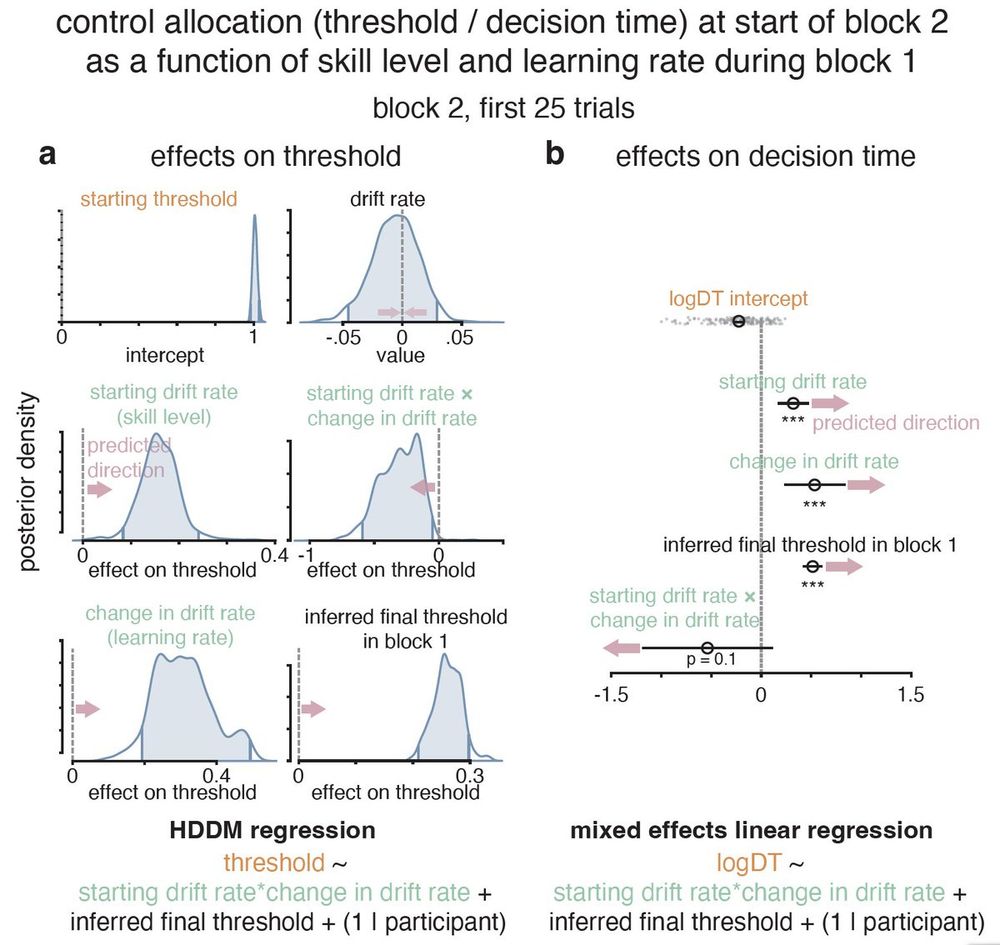
More precise regression analyses found that all three predicted relationships by the model were present in the data: skill level, learning rate and their interaction all predicted participant deliberation in the predicted directions.
22.08.2024 15:49 — 👍 0 🔁 0 💬 1 📌 0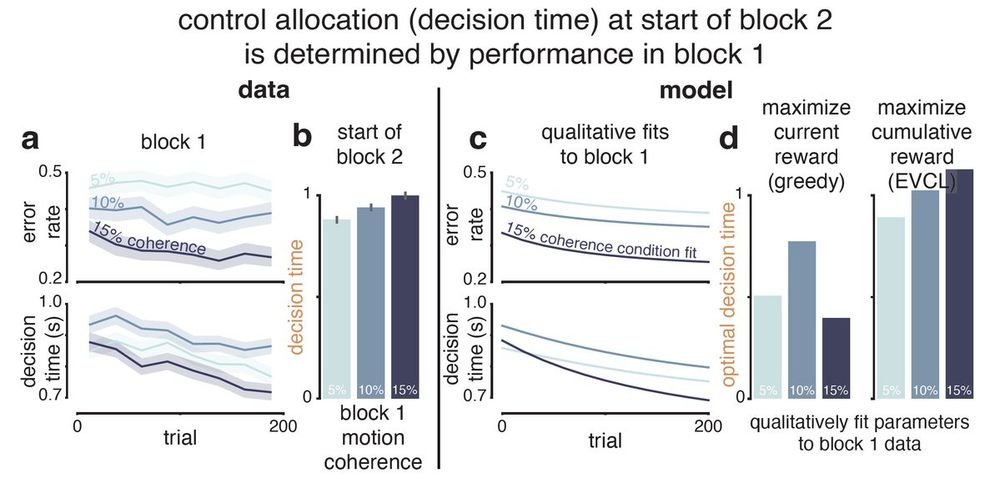
We asked whether their willingness to deliberate could be predicted by their levels of improvement before.
Initial fits to average behavior indicated that subjects who learned more were more willing to deliberate longer in a subsequent similar task.
Participants first engaged in a learning experience during which we measured their improvement. Participants then engaged in a very similar task during which we measured their willingness to deliberate (proxy for control), even though the task was unsolvable (not known to them).
22.08.2024 15:49 — 👍 0 🔁 0 💬 1 📌 0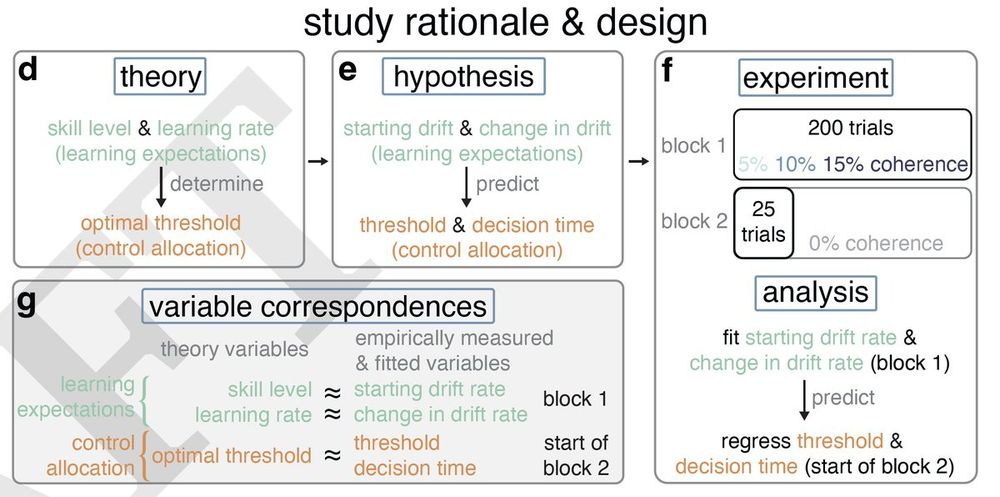
We designed a 2 block dot motion experiment to test these theoretical predictions.
22.08.2024 15:49 — 👍 0 🔁 0 💬 1 📌 0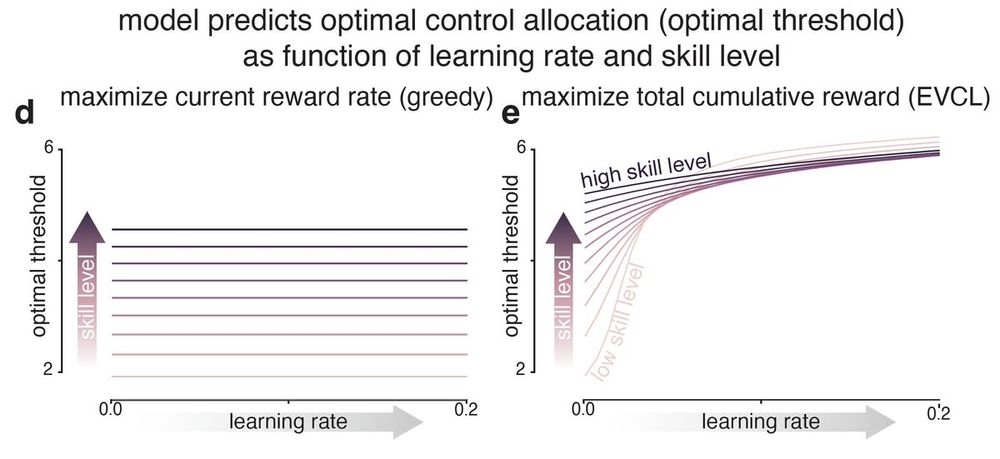
The model predicted that as opposed to a greedy model (current reward rate maximization, standard normative objective), a forward looking model would assign control based on skill level, learning rate and their interaction.
22.08.2024 15:48 — 👍 0 🔁 0 💬 1 📌 0
(The model is essentially a concatenation of two previous models I've worked on with colleagues. The Expected Value of Control for Learning [EVCL] model: escholarship.org/content/qt7w...
And the Learning Drift Diffusion Model [LDDM]:
elifesciences.org/articles/649...)
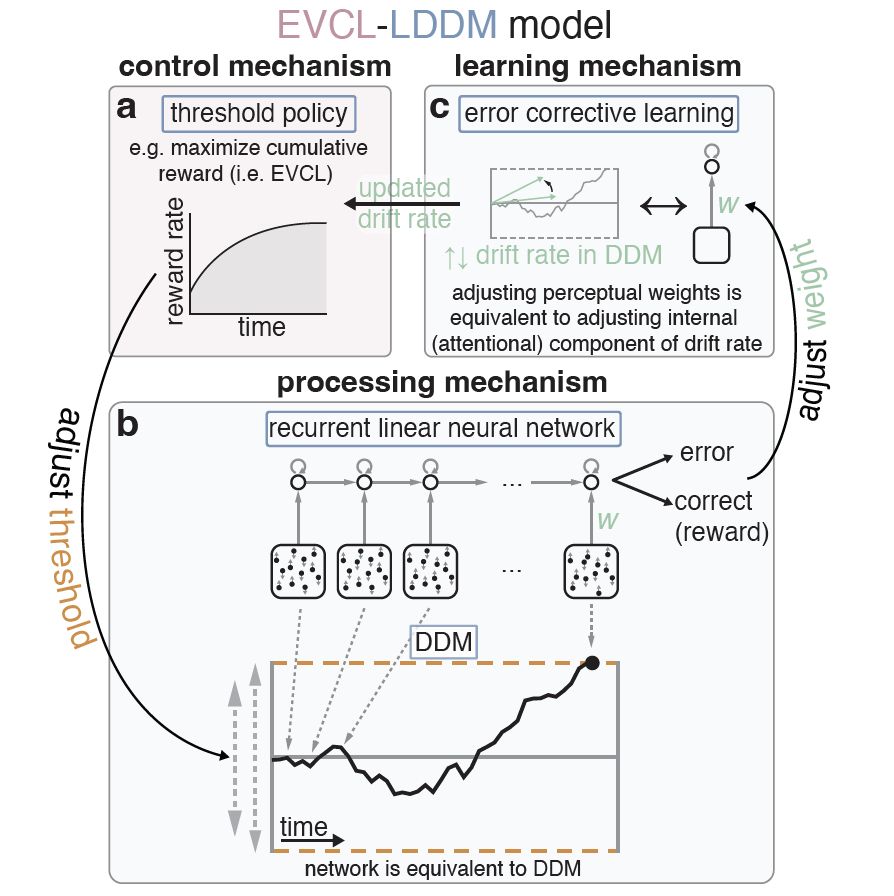
The model had a control component (with some objective, e.g. maximize total cumulative reward), a processing component (to make decisions, e.g. a DDM), and a learning component.
22.08.2024 15:47 — 👍 0 🔁 0 💬 1 📌 0We incorporated these ideas into a model of control allocation grounded in perceptual learning in order to test its predictions empirically.
22.08.2024 15:47 — 👍 0 🔁 0 💬 1 📌 0Current theories account for future discounted reward, but they tend to assume proficiency is a stable quantity, not one that is actually dynamically shaped by our mental effort choices. And if this is the case, then learning expectations should in turn affect those choices.
22.08.2024 15:47 — 👍 0 🔁 0 💬 1 📌 0We advance that there is no paradox (at least in the case of learning), and this is why:
22.08.2024 15:47 — 👍 0 🔁 0 💬 1 📌 0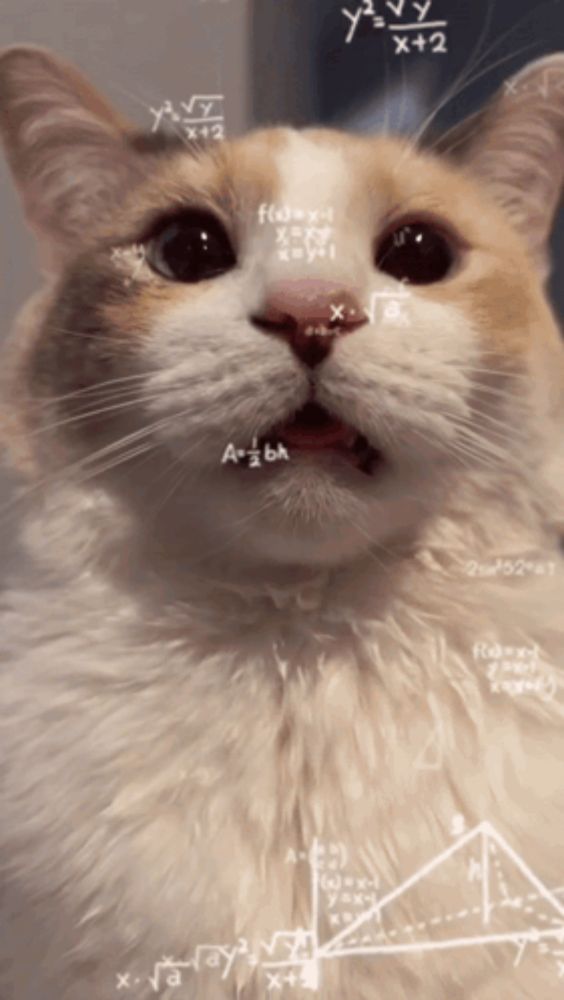
So much so that an "effort paradox" was identified several years ago to try to reconcile situations where people exerted mental effort when it didn't seem to make sense based on our current theories.
sciencedirect.com/science/arti...
And yet this special type of intertemporal choice (where costs and benefits are spread over time) is not readily solvable with current cognitive control theories because it requires engaging in an activity that is both less immediately rewarding and cognitively more effortful.
22.08.2024 15:46 — 👍 0 🔁 0 💬 1 📌 0The choice to invest in learning something or engage in familiar activities surrounds us like water surrounds fish. Should I make pasta or learn a new recipe? Should I continue hunting and pecking or learn to type properly? Should I stay in my job or learn new skills?
22.08.2024 15:45 — 👍 0 🔁 0 💬 1 📌 0
I'm delighted to share a new preprint alongside @musslick.bsky.social and Jon D. Cohen titled "Learning expectations shape cognitive control allocation."
How does the expectation to learn or improve at a task affect an agent's willingness to exert mental effort?
doi.org/10.31234/osf...
Hello bluesky! For my first act, I'd like to shamelessly self-promote my paper on metacognitive control of memory recall, just published in Psych Review.
psycnet.apa.org/doiLanding?d...
hello world
26.09.2023 15:27 — 👍 8 🔁 0 💬 0 📌 0